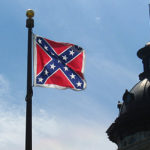I am a two-time alumna, former staff member and current faculty member at Hardin-Simmons University.
One of HSU’s traditions has included the Six White Horses program, which performs at a wide variety of events including rodeos and parades. In their performances, each of the six riders bears one of the six flags that have flown over Texas in modern history.
Recently, HSU decided that the Six White Horses will no longer carry any flag representing the Confederate States of America.
President Eric Brutmyer wrote to faculty and staff, “Each flag carries with it a context. In ideal circumstances, flags are unifying symbols, serving as common representations of purpose and pride. In other cases however, flags can be divisive symbols which create conflict and disunity.”
Pointing to the life’s mission of HSU founder and abolitionist Baptist pastor, James B. Simmons, President Bruntmyer stated that the decision continues HSU’s “commitment to unity in the purpose of Christ’s love.”
Willing to confront our complicity
I was present in a faculty and staff breakfast when the discussion of discontinuing to carry a Confederate flag was first announced. Upon hearing this news, I felt two distinct emotions.
First, I felt an immense sense of pride to be a part of an institution that is willing to confront its own complicity in racism.
On social media, I have seen dissent with President Bruntmyer’s decision among my fellow alumni. People say that carrying a flag represents an emphasis on history that should not be silenced. And I would agree with them. We should always seek to know our history.
Sign up for our weekly edition and get all our headlines in your inbox on Thursdays
Our history has formed us into who we are, but hopefully our history also informs us on how to be better followers of Christ in our current story.
Learning and engaging our history is different from honoring its mistakes by flying a representation of an entity created to sustain slavery and which has contributed to the institutional and systemic racism that still permeates our society today.
No country is perfect. Flags of other countries, as well as our own, also represent oppression and marginalization. But, in the case of the United States, a flag of the Confederacy is a symbol of the devaluing of human life in our society, and thus it is not something worthy of paraded celebration.
Personally, I am proud of HSU’s president for being brave enough to challenge tradition in the name of love and respect for all humanity.
But why not sooner?
The second emotion that I felt upon hearing the news was one of embarrassment and contrition. As proud as I am of the fact that this decision has been made, I am equally as sorry that the decision has not been made sooner.
I grew up in a neighborhood in which my white face was the minority. I had friends who were brown and black. We would stay out till dark playing in the streets together. But at some point, around middle school, we all began to mostly gravitate toward friends whose skin tones were more like our own.
I thought I was the opposite of a racist because I had grown up in this way. But I didn’t realize how much that gradual separation between me and my childhood friends meant.
I went off to join a group of friends that were mostly white and who had a lot of opportunities, just as I did. I didn’t realize how much white privilege was shaping the formation of our adolescent selves and the lives that we got to live.
My white friends and I were never stopped or approached by the police … except for that one time on prom night. (Sorry if I never told you that, mom.) People never moved to the other side of the street when we walked by. They never wondered if we were coming into a store to steal something.
We lived in a world in which we had privilege simply because of the color of our skin, and we had no idea that was the way it was.
Admitting my white privilege
It’s difficult to confront white privilege and to be willing to admit that I have benefited from the fact that institutional slavery existed in this country just a few hundred years ago. It’s difficult to admit that my ancestors were probably people who perpetuated the devaluing of human life.
So I am embarrassed that I have attended and worked at an institution that flew a flag representing systemic racism and I didn’t think to say something sooner. And I beg the forgiveness of anyone offended or hurt by HSU’s association with that flag.
White Christians, we have to do better. We have to admit when we are wrong and when we have been wrong in the past. We have to be willing to challenge tradition for the sake of love. We have to sacrifice so that reconciliation can begin — that is the example of the Christ we follow.
Meredith Stone is director of ministry guidance and instructor of Christian ministry and Scripture at Hardin-Simmons University’s Logsdon School of Theology. She is a member of the Baptist Standard Publishing board of directors.
















We seek to connect God’s story and God’s people around the world. To learn more about God’s story, click here.
Send comments and feedback to Eric Black, our editor. For comments to be published, please specify “letter to the editor.” Maximum length for publication is 300 words.